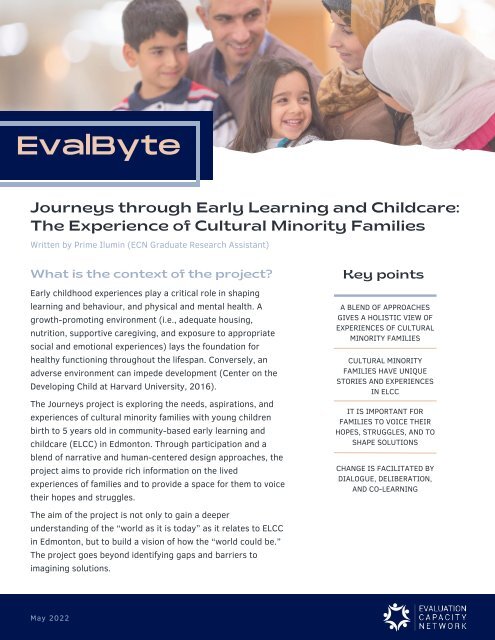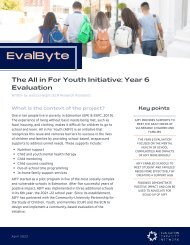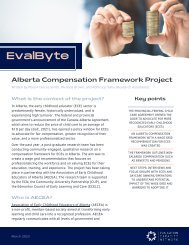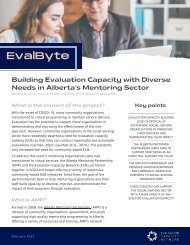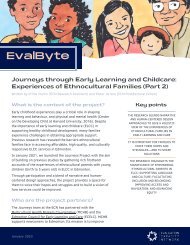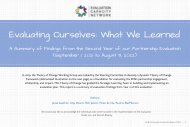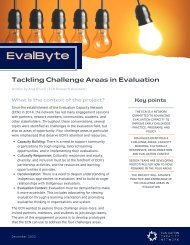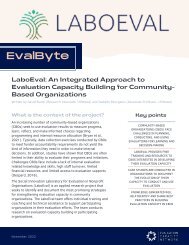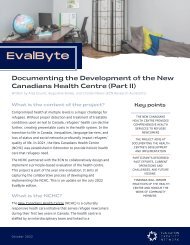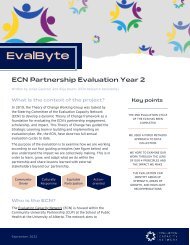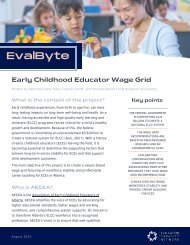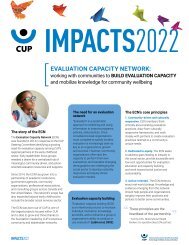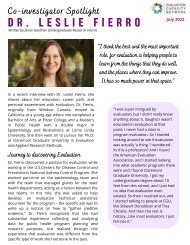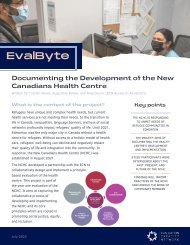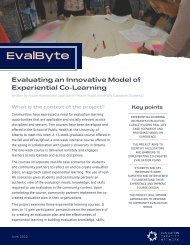Journeys through Early Learning and Childcare: The Experience of Cultural Minority Families
- No tags were found...
Create successful ePaper yourself
Turn your PDF publications into a flip-book with our unique Google optimized e-Paper software.
EvalByte<br />
<strong>Journeys</strong> <strong>through</strong> <strong>Early</strong> <strong>Learning</strong> <strong>and</strong> <strong>Childcare</strong>:<br />
<strong>The</strong> <strong>Experience</strong> <strong>of</strong> <strong>Cultural</strong> <strong>Minority</strong> <strong>Families</strong><br />
Written by Prime Ilumin (ECN Graduate Research Assistant)<br />
What is the context <strong>of</strong> the project?<br />
<strong>Early</strong> childhood experiences play a critical role in shaping<br />
learning <strong>and</strong> behaviour, <strong>and</strong> physical <strong>and</strong> mental health. A<br />
growth-promoting environment (i.e., adequate housing,<br />
nutrition, supportive caregiving, <strong>and</strong> exposure to appropriate<br />
social <strong>and</strong> emotional experiences) lays the foundation for<br />
healthy functioning <strong>through</strong>out the lifespan. Conversely, an<br />
adverse environment can impede development (Center on the<br />
Developing Child at Harvard University, 2016).<br />
<strong>The</strong> <strong>Journeys</strong> project is exploring the needs, aspirations, <strong>and</strong><br />
experiences <strong>of</strong> cultural minority families with young children<br />
birth to 5 years old in community-based early learning <strong>and</strong><br />
childcare (ELCC) in Edmonton. Through participation <strong>and</strong> a<br />
blend <strong>of</strong> narrative <strong>and</strong> human-centered design approaches, the<br />
project aims to provide rich information on the lived<br />
experiences <strong>of</strong> families <strong>and</strong> to provide a space for them to voice<br />
their hopes <strong>and</strong> struggles.<br />
Key points<br />
A BLEND OF APPROACHES<br />
GIVES A HOLISTIC VIEW OF<br />
EXPERIENCES OF CULTURAL<br />
MINORITY FAMILIES<br />
CULTURAL MINORITY<br />
FAMILIES HAVE UNIQUE<br />
STORIES AND EXPERIENCES<br />
IN ELCC<br />
IT IS IMPORTANT FOR<br />
FAMILIES TO VOICE THEIR<br />
HOPES, STRUGGLES, AND TO<br />
SHAPE SOLUTIONS<br />
CHANGE IS FACILITATED BY<br />
DIALOGUE, DELIBERATION,<br />
AND CO-LEARNING<br />
<strong>The</strong> aim <strong>of</strong> the project is not only to gain a deeper<br />
underst<strong>and</strong>ing <strong>of</strong> the “world as it is today” as it relates to ELCC<br />
in Edmonton, but to build a vision <strong>of</strong> how the “world could be.”<br />
<strong>The</strong> project goes beyond identifying gaps <strong>and</strong> barriers to<br />
imagining solutions.<br />
May 2022
Who are MCHB <strong>and</strong> ECELC?<br />
<strong>The</strong> <strong>Journeys</strong> team is a partnership between the<br />
Evaluation Capacity Network, Multicultural Health<br />
Brokers Co-operative (MCHB) <strong>and</strong> the Edmonton<br />
Council for <strong>Early</strong> <strong>Learning</strong> <strong>and</strong> Care (ECELC).<br />
MCHB supports newcomers to Edmonton. Its<br />
mission is to improve newcomer families’ health<br />
<strong>and</strong> well-being, <strong>and</strong> to encourage communitybuilding<br />
so they can thrive <strong>and</strong> actively contribute<br />
to society. ECELC provides leadership in developing<br />
an integrated system <strong>of</strong> high-quality ELCC services<br />
in Edmonton that particularly focuses on the needs<br />
<strong>of</strong> low-income <strong>and</strong> vulnerable families.<br />
Where is the project at?<br />
<strong>The</strong> <strong>Journeys</strong> team <strong>and</strong> its partners designed a<br />
community-based process which included a<br />
discussion around ethics <strong>and</strong> collecting stories.<br />
<strong>The</strong>y developed an interview guide with questions<br />
about quality in ELCC, <strong>and</strong> have organized focus<br />
groups <strong>and</strong> interviews with visible cultural minority<br />
families to collect data.<br />
<strong>The</strong> research is envisioned as a “change process”<br />
that involves three str<strong>and</strong>s <strong>of</strong> interwoven activity:<br />
A) Engaging <strong>and</strong> Convening: This str<strong>and</strong> facilitates<br />
dialogue, deliberation <strong>and</strong> intercultural encounters<br />
with key partners <strong>and</strong> potential allies.<br />
B) Listening <strong>and</strong> <strong>Learning</strong>: This str<strong>and</strong> draws on<br />
participatory methodologies to develop rich case<br />
studies <strong>of</strong> lived experiences <strong>and</strong> descriptions <strong>of</strong><br />
strengths <strong>and</strong> assets along with systemic<br />
barriers. <strong>The</strong> project is currently at this stage.<br />
C) Reflecting <strong>and</strong> Making Sense: This str<strong>and</strong> <strong>of</strong><br />
activity will use theme-weaving, journeymapping,<br />
<strong>and</strong> other forms <strong>of</strong> co-analysis to<br />
identify potential leverage points for change.<br />
<strong>The</strong>se streams <strong>of</strong> activity will be supported by<br />
orientation <strong>and</strong> capacity-building sessions where<br />
appropriate.<br />
Why is the project<br />
meaningful?<br />
<strong>The</strong> engagement <strong>and</strong> research aim to provide<br />
critical information on the context <strong>of</strong> ELCC in<br />
Edmonton <strong>and</strong> on the lived experiences <strong>of</strong><br />
cultural minority families as they attempt to<br />
access <strong>and</strong> receive childcare. <strong>The</strong> findings will<br />
also provide insights on opportunities for<br />
collective action to build on strengths, leverage<br />
intercultural knowledge, <strong>and</strong> overcome gaps in<br />
the current system.<br />
Resources<br />
ECELC - What We Heard: Educators<br />
Supporting Newcomer <strong>Families</strong><br />
Intercultural Child & Family Centre<br />
Reference<br />
Center on the Developing Child at Harvard University. (2016). From best practices to break<strong>through</strong> impacts: A science-based approach to<br />
building a more promising future for young children <strong>and</strong> families. Retrieved from www.developingchild.harvard.edu<br />
Acknowledgment<br />
<strong>The</strong> project is lead by Pieter de Vos (ECN), Yvonne Chiu (MCHB), Naheed Mukhi (MCHB), <strong>and</strong> Heather Raymond (ECELC). We thank the<br />
Mount Royal University Bachelor <strong>of</strong> Child Studies students involved in this project for their contributions to this project.<br />
May 2022


